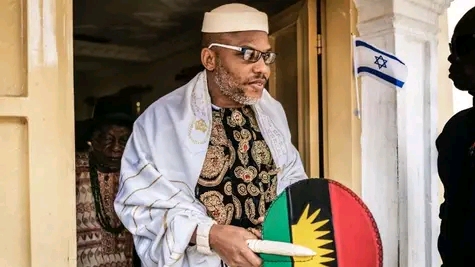By Ollus Ndomu
The news about Indigenous People Of Biafra -IPOB- leader’s Thursday discharge and acquittal triggered a wave of celebrations across Nigeria’s South East regions and elsewhere across the globe, particularly among IPOBnated Nigerians in the diaspora.
On Thursday, Nigeria’s Appeal Court made a landmark rulling that dropped all charges against Nnamdi Kanu.
According to the court, the controversial separatist leader had been illegally arrested abroad adding that even his extradition from Kenya was unconstitutional.
The court’s ruling is major blow to the federal government which had detained IPOB’s Kanu on a number treason and terrorism-related charges.
In a Facebook post to confirm the ruling, his counsel, Ifeanyi Ejiofor wrote “Appeal allowed. Onyendu Mazi Nnamdi KANU, discharged and acquitted. We have won! Victory victory victory victory.”
Reacting Friday to the turn of events, the government said that it was exploring other legal avenues to overturn the court’s ruling.
“Kanu was only discharged and not acquitted,” said a spokesperson for Attorney General Abubakar Malami, so it appears unlikely he will be freed imminently.
The Attorney General’s office added that the court’s decision was only based on the extradition of Mr Kanu, and did not apply to those charges that predate it which “remain valid issues for judicial determination”.
Mr. Kanu who denies any wrong doing, was originally arrested in 2015 but he fled Nigeria in 2017 while out on bail.
The Nigerian government is working to silence IPOB, a group campaigning for the creation of an independent state in the county’s south-eastern region.
In 2021, Mr. Kanu, a holder of the UK passport – was seized and sent back home to stay in detention.
The case had become even more interesting as the Appeal Court also ruled the Federal High Court did not have the jurisdiction to try Mr Kanu.
He initially faced 15 charges, but eight had previously been dropped.
In an interview with the BBC, Constitutional and Human Rights Lawyer Luka Musa Haruna said the court’s ruling meant there was nothing to stop Mr Kanu from being re-arraigned on different charges but also acknowledged that the IPOB leader was now technically a “free man.”
The prominent lawyer further said “the federal government should comply with the judgement and release Nnamdi Kanu”.
Mr. Kanu’s lawyers are also engaging authorities to have their client released.
“No new charges can ever stick” against Mr Kanu because “the extraordinary rendition has created a permanent barrier to his prosecution. He must be released first,” Aloy Ejimakor said on Twitter. He also added that Mr Kanu should be free to travel without hinderance.
As of Friday afternoon, the IPOB leader had not yet been released from detention but his lawyers confirmed they were seeking to have him freed as per the court order.
The Igbo people’s desire to have an independent state dates from as far as early 1960s.
In 1967 ethnic Igbo leaders declared independence for the state of Biafra, but after a civil war, which led to the deaths of up to a million people, the secessionist rebellion was defeated. It has now been reawakened the well-coordinated movement, IPOB.


